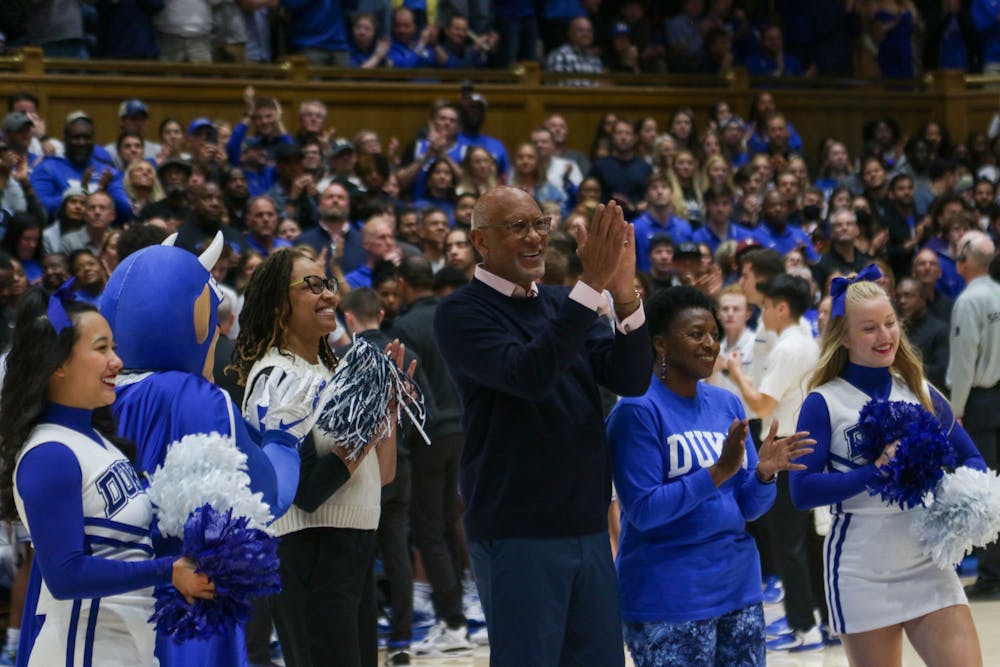
Spectators in Cameron Indoor Stadium often look in awe at Duke men’s basketball’s five National Championship banners, won on the backs of numerous legendary Blue Devils. Eddie Cameron, the stadium’s namesake, built the program and brought the university into the ACC. Coach Mike Krzyzewski made Duke into a national brand, earning all five banners and a whopping 13 Final Four appearances. Christian Laettner, perhaps the greatest college basketball player ever, led the team to two National Championships and four Final Fours. With all of these Blue Devil legends, one important name often goes undiscussed: C.B. Claiborne.
Born in Danville, Va., in the late 1940s, Claiborne spent his entire childhood in the Jim Crow South at the height of racial segregation. In 1966, Claiborne notably became the first African-American basketball player to suit up in Duke Blue. Besides overcoming racial barriers to enroll at Duke and play for the basketball team, some truly extraordinary circumstances led to his appearance on the court. Vic Bubas, head basketball coach at the time, suspended nine of his players for unspecified violations, paving the way for Claiborne to earn his first minutes against Penn State and make history.
During his time at the university and with the team, Claiborne was frequently mistreated due to his race. As a result of this discrimination, Claiborne spent most of his time in Durham at nearby N.C. Central University, an HBCU.
However unwelcomed Claiborne felt at Duke, he understood the importance of his role in integrating the Blue Devils, and college basketball as a whole. In a 2013 interview, Claiborne noted that playing for Duke was a rare opportunity that not only benefited him, but also created chances for others in the future. He later emphasized his belief in basketball as an avenue for social change and thanked Coach Bubas for allowing him to be a force towards that change.
"The first thing that [Duke] did was really made me more aware of a larger world and a larger perspective of the world," Claiborne told The Chronicle. "Those experiences going to California and going to New York as part of the basketball program were absolutely eye opening."
While Claiborne’s impact on breaking racial barriers can be compared to the likes of Bill Russell, his playing career did not reach the same heights. Claiborne averaged just 4.1 points per game over his time with the Blue Devils, during a period in which Duke was not yet a juggernaut of college basketball. However, he did have some memorable moments, including that 13-point outburst in a comeback victory against Clemson, which The Chronicle covered at the time.
The success of the program, and in many ways the university as a whole, cannot be discussed in full breath without mentioning C.B. Claiborne. Countless Black players have starred for the Blue Devils in the half-century since Claiborne’s first game. From Grant Hill to Jay Williams to Zion Williamson, many greats have reached national stardom in part due to the foundation Claiborne set all those years ago.
While Claiborne will always be remembered for his basketball career, he felt the education he received was the most important part of his time with the Blue Devils. Claiborne graduated with a degree in engineering, the first of his four total degrees. Claiborne prides himself on teaching and now serves as a professor in the business school at Texas Southern University, another HBCU.
“[Duke] really opened my eyes about the potential [of] what you can do in life, the kinds of people to be associated with," Claiborne said. “It had a profound experience on my growth.”
Duke has recently made a concerted effort to commemorate Claiborne’s impact on Blue Devil basketball. In 2023, all Duke players donned the number 23, just as Claiborne did, in pregame warmups, and at the 2024 Commencement Ceremony, Claiborne was granted an honorary doctorate for his longtime commitment to social justice.
When people think of Duke University, their minds often jump to Blue Devil basketball; the two go hand in hand. Duke as an institution would not be the same without its iconic basketball program, and the Blue Devils would not be what they are without C.B. Claiborne.
Zoe Kolenovsky contributed reporting.
Get The Chronicle straight to your inbox
Sign up for our weekly newsletter. Cancel at any time.

